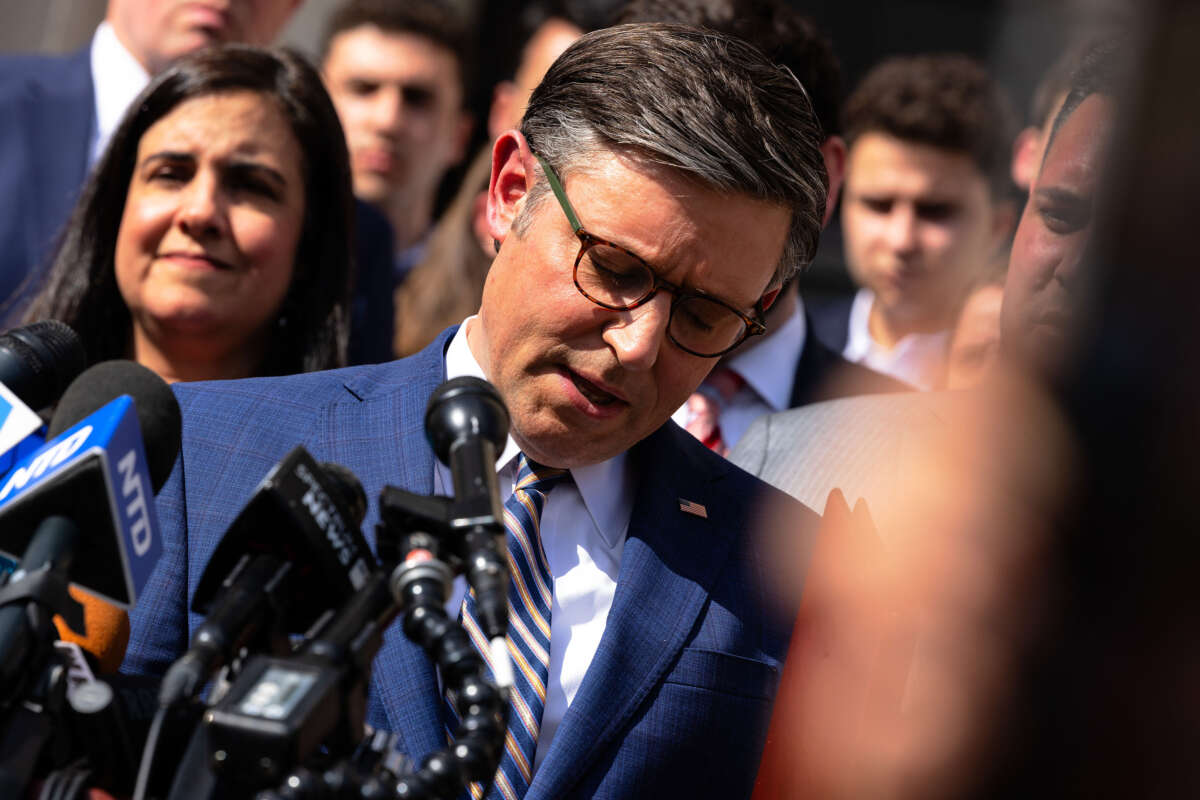As some Republicans in the House of Representatives ramp up efforts to oust Speaker of the House Mike Johnson (R-Louisiana), a new report reveals that Democrats may come to the extremist speaker’s rescue should such a vote be forced to the floor of the chamber.
Rep. Marjorie Taylor Greene (R-Georgia) filed a motion to vacate Johnson from his post late last month. So far, two other Republicans have said they would also support a potential vote. There are likely others who are considering doing so within the GOP conference.
Greene filed her motion without privilege, which means that it has to go through the regular channels of the House, which will result in it being tabled. But she could change the status of the measure to privileged, which would force a vote right away, under rules established by Republican leaders.
With the House as narrowly divided as it is, just three Republican votes would be enough to remove Johnson from the speakership, if every Democratic lawmaker voted against him like they did when former Speaker Kevin McCarthy (R-California) faced a similar vote in October. However, this time around, several Democrats are signaling they won’t join such an effort.
According to a Politico report published on Wednesday, dozens of Democrats believe that members of their conference will “step in” to save Johnson from being kicked out of his role. Centrists within the party, sources told the publication, have already “gamed out” how to defeat a motion to vacate measure.
The Democratic conference hasn’t officially told members how to vote on a motion to vacate proposal, but several Democrats spoke on the record to Politico about why they were unwilling to vote against a Republican speaker now versus last fall, citing Johnson’s willingness to cooperate on big spending measures (most recently, the Ukraine spending package). Many, including former Democratic House leader Steny Hoyer, framed it as being wrong to “penalize” Johnson “for doing the right thing.”
“If he keeps acting the same way, I’d keep voting the same way,” said Rep. Marie Gluesenkamp Perez (D-Washington). “I wouldn’t vote for him in an election for speaker, of course. But that’s a much different circumstance.”
Others suggested that Johnson was a better option than a new, possibly less cooperative Republican would be, and expressed fear for the unknown outcome that could result from a motion to vacate.
“We’ve seen what’s happened with the first ouster, and now we have a second speaker,” said Rep. Troy Carter (D-Louisiana). “We’ve seen what’s happening with the paralysis that this has caused, the inability to move the budget forward.”
The number of Democrats who would back Johnson against a motion to vacate could be high — Rep. Emanuel Cleaver (D-Missouri) told Politico it could even be “the majority” of the Democratic caucus.
Johnson is decidedly more conservative than his predecessor McCarthy was. But Democrats view him as more “honest” when it comes to deal-making, Politico reported.
Notably, Johnson has openly expressed far right, Christian nationalist sentiments and sponsored extreme anti-LGBTQ bills.
Johnson, for example, was the author of a federal “Don’t Say Gay” bill in 2022 that went beyond what state-level bills restricted. Under Johnson’s proposal, any federally funded institution — not just schools — that recognized gender identity or sexual orientation would lose its funds.
Johnson was formerly a top counsel and senior spokesperson for the Alliance Defending Freedom, a far right group that has pushed anti-LGBTQ policies as well as anti-reproductive rights views. Indeed, the ADF wrote the anti-abortion law in Mississippi, which eventually led to the downfall of federal abortion protections that were established by Roe v. Wade.
Like the group he once worked for, Johnson attempted to force government officials to take such stances, writing a letter, for example, to health officials in Baton Rouge, Louisiana, demanding they shut down a reproductive care clinic in that city.
As a congressional report noted earlier this year, Johnson is a Christian nationalist who believes his religious views should be codified into law, a clear violation of religious rights protections within the First Amendment. Johnson has expressed ambivalence toward those standards, too, believing that the Establishment Clause of that amendment merely bans a national religion, and nothing more — that the promotion of one religion through legislation is not prohibited, so long as that establishment isn’t formally recognized.
Johnson, who once stated that only God gives authority to individuals to become president, also led an effort to stall the certification of President Joe Biden’s election win in 2020. At the time, Johnson was the caucus vice chair of the Republican Party, and led the amicus brief signed by over 100 GOP lawmakers to back a Texas-led lawsuit seeking to delay the outcome of the race, citing false claims of possible fraud affecting the election.
Johnson informed his colleagues in an email that it was former President Donald Trump himself who had asked him to lead such an effort.
“[Trump] specifically asked me to contact all Republican Members of the House and Senate today and request that all join on to our brief,” Johnson said in his message.
Democrats considering helping Johnson retain his speakership seem to be okay with these and other disturbing facts about him, choosing stability and avoidance of a chaotic leadership vacuum over ousting a leader with extremist, far right positions.
